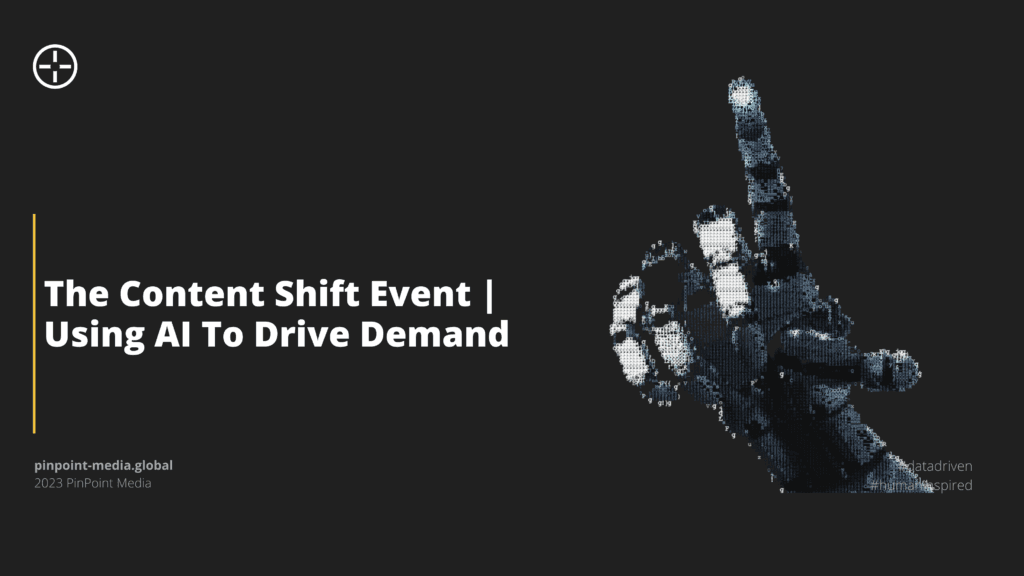AI comes in many different forms within the marketing mix but how can it accelerate your business efficiently and not as trend? As a B2B brand, you should already be considering using AI within your business to help drive demand. At PinPoint Media we believe AI is the future and this is why we are investing in, not only the technology but, also our time to understand and educate ourselves on how AI is developing within the marketing world. Over the past 24 months we have been working with brands who have wanted to explore the opportunities of this technology and an in-house case study we’re proud to showcase is our work with CANNA UK Paid & Organic Social Media who start to showcase the advantages of brands embracing this technology.
For our second in the series of “The Content Shift” events, we felt it was appropriate to focus on the pro’s and con’s of AI.
The Content Shift: Hyper-Personalising B2B Experiences – Using AI to Drive Demand

The Content Shift | Using AI To Drive Demand @The Curve Club, London
Hosted by our Sales & Marketing Director, Amy Green, we spoke to Samartha Vashishatha from Meta, Erica Colson from BSI, Claudia O’Shea from Kantar and Jessica Barder from PinPoint Media.
Here are the 4 topics of discussion we delved into.
Personalisation Segmentation
Our first topic of discussion is personalisation. In an era of increasing customisation and personalisation, brands are finding new and innovative ways to connect with their audience. One powerful strategy that has emerged is personalised segmentation. By diving deeper into understanding their customers and categorising them into hyper-personalised tribes, brands can create tailored content that resonates with each group’s specific needs and preferences.
Personalised segmentation allows brands to go beyond generic marketing messages and instead deliver targeted content that speaks directly to the pain points and aspirations of their customers. By honing in on individual traits and characteristics, brands can authentically engage with their audience on a deeper and more meaningful level. This not only enhances customer engagement but also fosters a sense of belonging, trust, and loyalty. When customers feel that a brand genuinely understands and cares about their unique requirements, they are likely to develop a strong connection and remain loyal in the long run.
Furthermore, personalised segmentation enables brands to optimise their marketing efforts by allocating resources effectively. By identifying the different tribes within their customer base, brands can allocate marketing budgets towards the most relevant segments, ensuring a higher return on investment. This targeted approach allows brands to refine their messaging and create campaigns that resonate with specific audience segments, maximising the success of their marketing endeavours.
By tailoring content specifically to the unique needs, preferences, and pain points of each group, brands can foster loyalty, trust, and a sense of belonging. In an ever-evolving marketing landscape, personalised segmentation empowers brands to stand out from the competition and create a meaningful impact on their customers.
Our key takeaway from harnessing personalisation to customise content for distinct tribes according to their specific requirements is essential in the competitive B2B realm. It proves to be a formidable asset for nurturing robust customer relationships and implementing highly productive marketing and sales tactics.

The Content Shift Event Panellists
Quality or Quantity
In the realm of AI-driven content strategy, finding the right balance between quality and quantity is crucial to its effectiveness. A critical consideration for businesses is determining when to prioritise quality over quantity in order to optimise their content strategies. This ensures that the content produced not only resonates with the target audience but also aligns with broader goals and objectives.
But can this balance be struck when using AI to create both quality and quantity content? One advantage of artificial intelligence is its ability to streamline processes and enhance workflow efficiency.
On the other hand, it’s analytical capabilities play a pivotal role in nurturing experiences. By harnessing artificial intelligence to analyse data, brands can gain insights into audience behaviour, predict content performance, and anticipate emerging trends. This technology can also be utilised to test content and predict emotional responses, enabling the creation of tailored and emotionally resonant content that enhances customer engagement and trust.
From this topic discussion, our key takeaway is that AI has revolutionised content creation in B2B marketing, offering efficiency and personalisation. Leveraging AI for data analysis allows brands to gain valuable insights and create emotionally resonant content that enhances customer engagement. As quoted from Meta panellist Samartha Vashishtha – “Why would someone invest their time in looking at your content if you haven’t invested any time in creating it?”
Streamlining Process
AI technology has revolutionised many industries, including marketing and content creation. One particular tool that has gained momentum is the use of writing prompts to generate on-brand, authentic visual assets. This tool allows marketers to create engaging visuals quickly and efficiently, which is especially crucial in the fast-paced digital environment.
However, in the process of utilising this technology to streamline processes, there is a risk of creating content that does not align with a brand’s diversity, equity, and inclusion (DE&I) goals. Algorithms are not perfect and can accidentally pick up on biases and assumptions that may not align with a brand’s values. To mitigate the risk, it is essential to thoroughly review the content generated by AI and ensure that it upholds the brand’s DE&I goals.
Moreover, it is essential to consider the impact on junior marketers. While AI-powered tools may be efficient, it is crucial to provide training and support to ensure that the tool enhances their skills and abilities, rather than replaces them. The proper use of AI-powered technologies can enrich content creation processes, but it is essential to use it mindfully and responsibly to uphold brand values and ensure that content creation remains a collaborative effort between humans and technology.
In conclusion, the possibilities of AI in content creation are extensive, but it is vital to remember its limitations and be mindful of its potential biases. Brands that utilize AI tools for content creation should ensure that the content aligns with their DE&I goals and provides valuable experiences to their audience. With the proper training and support, the technologies can enhance efficiency and creativity while maintaining authentic and brand-aligned content creation processes.

The Content Shift Event
Enhancing Relationships within AI
During our discussion, we delved into the crucial role of nurturing experiences and how AI’s analytical capabilities play a pivotal role in gaining valuable insights. AI has the power to predict content performance, allowing businesses to cultivate stronger connections with their target audience and existing customers. The use of algorithms to examine search data has proven to be invaluable in understanding how people search and anticipate emerging trends, enabling businesses to stay ahead in a rapidly changing market.
Additionally, leveraging artificial intelligence to test content and predict emotional responses emerged as a key topic. By using AI to analyse data, companies can craft tailored content that elicits desired reactions from their audience. This personalised approach helps transform passive interest into active engagement, enhancing the overall B2B experience.
The discussions highlighted how AI-driven insights enable businesses to make data-driven decisions, enabling them to create content that resonates with their target audience and drives meaningful interactions. By harnessing the abilities of artificial intelligence, the capabilities companies can gain a competitive edge in today’s dynamic market, where connecting with customers on a deeper level is paramount.
From this we learned using AI for data analysis offers not just valuable insights into forecasting content performance and emerging trends but also empowers the development of emotionally compelling content, thereby improving customer engagement, trust, and overall relationships.
Audience
We would not be celebrating the success of this event if it wasn’t for our audience who attended. We hope you thoroughly enjoyed the event and learned something from our industry experts who are a part of the frontline in this technology evolution. With the opportunity to network prior to the event discussions taking place, we hope you got to know your fellow industry leaders and maybe make a LinkedIn connection or two!
Your questions showed a regard for how ‘scary’ the world of the emerging technology can be however, we really believe this is something we should embrace within the marketing world for your B2B business.
We were even lucky enough to have some of our attendees post about it on Linkedin to which you can view in the links below and see the insights they took out of the events and even a couple of snaps they got!
Overview of The Content Shift Event – LinkedIn
Overview of The Content Shift Event – LinkedIn
More Events?
With 2024 around the corner, we’re already busy planning for next year’s events. If you’re interested in attending, then please keep a look out on our LinkedIn page. This event saw us receive some positive feedback such as “I really felt like I have key takeaways that I can implement into my marketing strategy” and “I found this event so relevant to what we are trying to achieve with AI next year” therefore you do not want to miss out on the next event opportunity.
Furthermore, if you believe you could sit on our future panels, don’t be afraid to get in touch with our key organiser Amy Green. Please email her at the following address: amy.green@pinpoint-media.co.uk with your industry expertise.
A Big Thank You
We’d like to give a big thank you and mention to Soho House London who catered to our needs for not only this event but for our previous Content Shift Event. It has proven to be a fabulous, modern location for our events and cannot falter them.

The Content Shift Event | Food at The Curve Club
Whilst the discussions between panellists and the audience were beyond insightful, we cannot thank the PinPoint Media team who were behind the runnings of the event.

The PinPoint Team
Until next time,
The Content Shift Event Team
Stay Informed with PinPoint Media Blog




